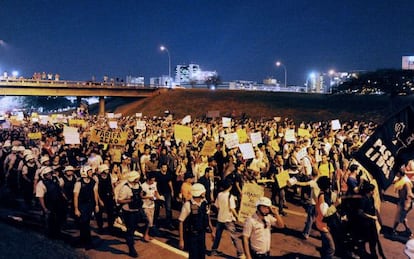Brazil protestors on victory parade
Demonstrators celebrate countrywide U-turn on fare hikes, while planning strategies for achieving their eventual goal — free public transport

After days of massive protests ignited by passenger fare hikes, government officials in Rio de Janeiro and São Paulo announced on Wednesday that they would roll back public transport fare increases, joining other cities across Brazil that also canceled planned price rises.
The country’s two biggest cities had introduced fare increases of 20 cents of a real (about 0.70 euros) at the beginning of the month, which set off a violent demonstration on June 7 in São Paulo that left more than 150 people injured and 230 arrested.
The protest became the rallying cry for a chain of demonstrations held in different cities over the past 13 days, including a massive protest on Monday night when an estimated 250,000 people took to the streets in numerous cities to demand better opportunities and social conditions as well as press for other causes.
Nevertheless, the announcement of the cancelation of the fare rises didn’t scale back the protests. On Wednesday, thousands blocked the main roads and principal thoroughfares in the capital Brasilia and São Paulo. Police in Rio also pushed back protestors who for a second time tried to reach the Maracanã stadium where Italy and Mexico and Brazil and Japan squared off in Confederations Cup soccer matches.
Let’s support our national team. Let’s forget about the confusion,” says Pelé
The protestors were also expected to turn out again for Thursday’s Spain vs. Tahiti match, but organizers say this time they will be celebrating victory in the transport fare battle.
On Monday, officials in the cities of Porto Alegre, Blumenau, Recife, Cuiabá and João Pessoa announced they were canceling the price hikes.
In São Paulo, the ticket machines will need to be reprogrammed, so the original prices won’t go into effect until Monday. To ride the subway or a city bus there the fare will be three reals or 1.05 euros, and in Rio since Wednesday bus fares have gone back to 2.75 reals or 0.95 euros.
In a video he posted on YouTube, soccer legend Pelé asked his fellow Brazilians to stop protesting and concentrate on the preparations for next year’s World Cup. “I am asking Brazilians not to confuse the issues. Let’s support our national team. Let’s forget about the confusion here in Brazil. Let’s forget about the protests,” he said.
One of the major complaints that emerged during the protests was the amounts of money the Brazilian government was spending to host the World Cup and the 2016 Olympics in Rio.
Giving a different viewpoint from another generation, Neymar, the Brazilian forward who recently signed for Barcelona, gave his support to the protestors. “I am sad about what is happening in Brazil,” said the 21-year-old on his Instagram account before playing on Wednesday. “I always had faith that we would not have to go this far and take to the streets to demand better transportation and education and health conditions.
“I always had faith that we would not have to go this far,” wrote Neymar
“From the time I go out on the pitch in this match against Mexico, I will be entering the stadium inspired by the demonstrations. I stand together with you,” Neymar wrote.
Luisa Mandetta, a 19-year-old member of the so-called Free Pass Movement (MPL), the grassroots organization that called for the June 7 protest, described the mass demonstrations as “a people’s victory.”
“Our movement accomplished its first goal. And now we are going to continue to fight for free public transportation, which has always been our final objective,” she said.
The MPL had called for daily demonstrations until the price fare increases were rolled back. The organization has now said it will hold another demonstration on Thursday, but this time “to celebrate the victory and plan what we are going to do in the future,” Mandetta said. Geraldo Alckmin, governor of São Paulo state and member of the Brazilian Social Democratic Party (PSDB), said that his administration will have to make cutbacks on other investments “because the transport companies cannot assume the impact [of the cancelation of the fare increases].” He wasn’t clear on what investments will be chopped, but many fear there could be cuts in social services and education.
The decision to roll back the prices in the two biggest cities came one day after President Dilma Rousseff said in a televised speech that she had been listening to the people’s demands. “The sizes of yesterday’s demonstrations shows the energy of our democracy, the strength of the voice on the streets, and the civility of our population,” the Workers Party leader said.
Monday’s massive demonstration was the biggest to take place in Brazil in more than two decades. Even some prominent Brazilian analysts admitted that they were at a loss for words because they couldn’t explain the phenomena. Gilberto Carvalho, Rousseff’s Cabinet chief, admitted he couldn’t understand the reasons why people were demonstrating.
The majority of the demonstrations have been peaceful but there have been pockets of violence reported in major cities. Hours after the fare prices were rolled back, protestors tried to break into São Paulo City Hall while also ransacking several stores.







































